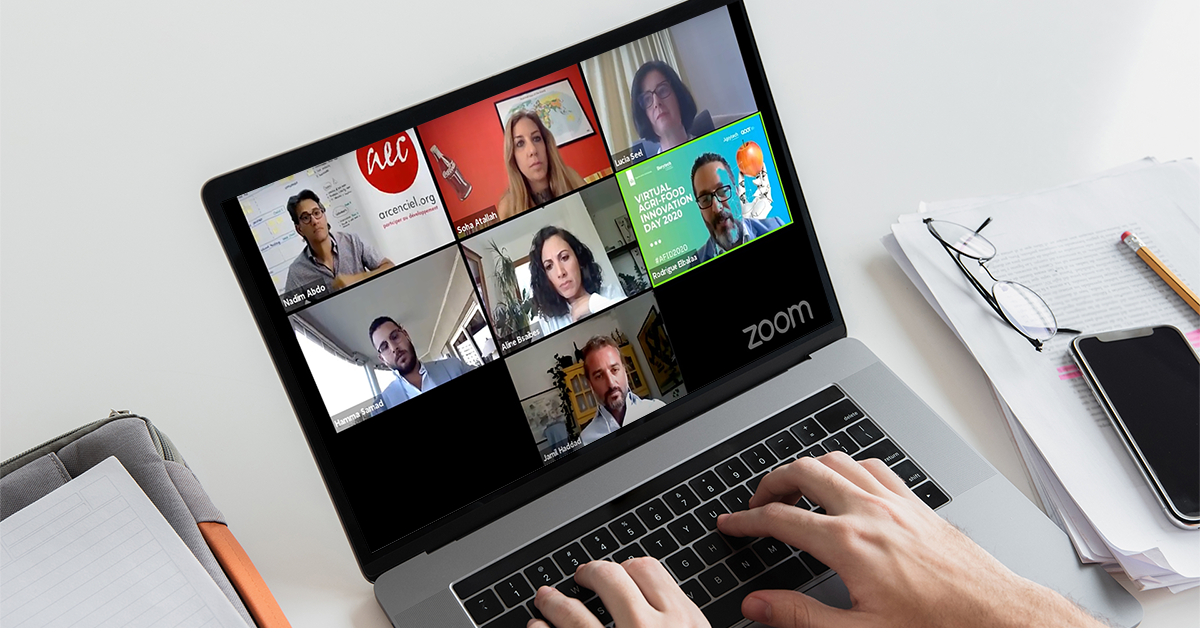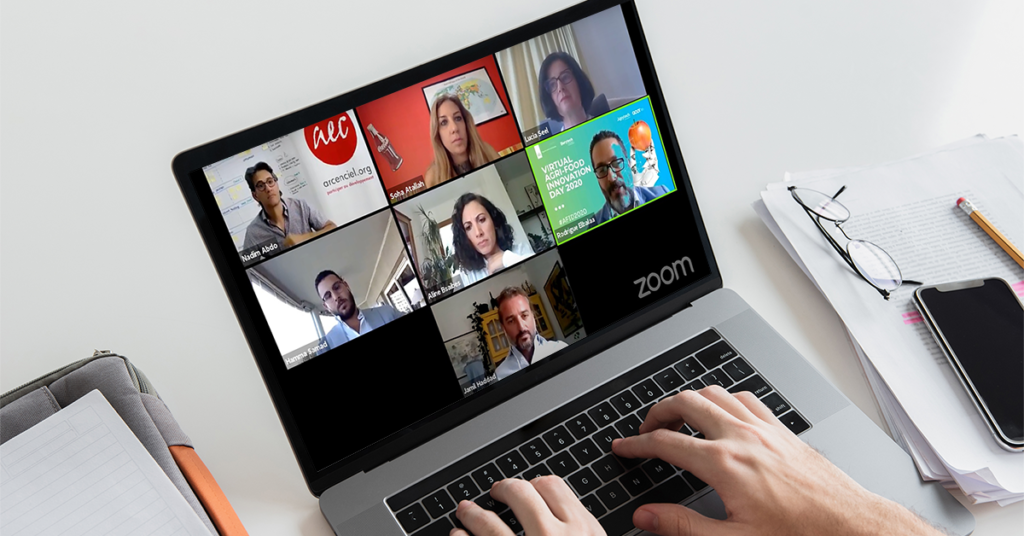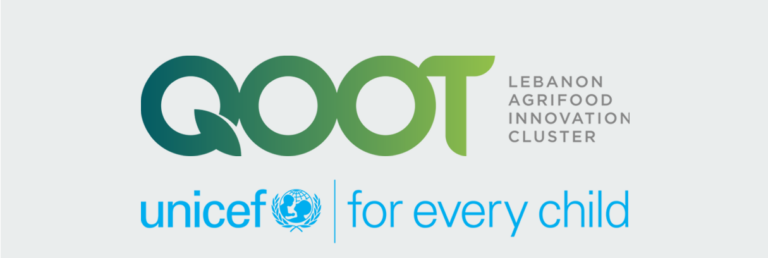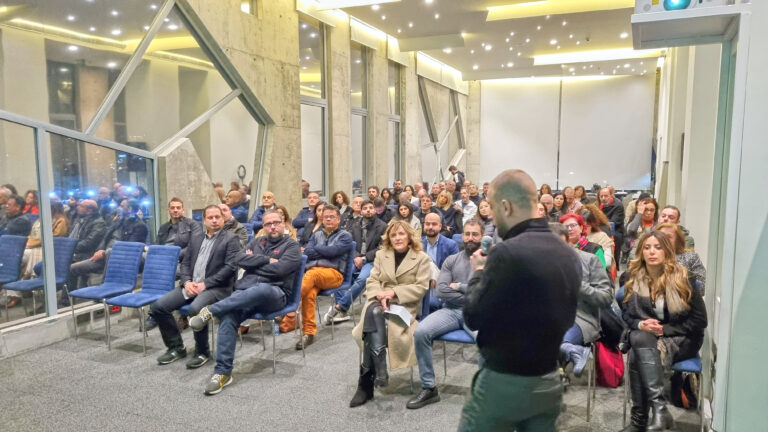
Around the world, clusters play a pivotal role in the recovery of ailing economies. They are key players that contribute collaboratively to the next normal. But how do clusters and collaborative initiatives help craft a new improved normal?
The QOOT Agri-Food Innovation Cluster of Lebanon organized a panel discussion titled ‘Cluster-Driven Circular Economy’ part of the Agri-Food Innovation Day – AFID2020, highlighting how circular ambitions have been affected by the economic crisis and providing a better understanding of the role of clusters in the circular transition.
The panel with its guest speakers aimed to answer two essential questions on how the financial crisis could reinforce the implementation of circular economy principles and the role of clusters in catalyzing this. In this discussion, the speakers represented the breadth of the cluster ecosystem and offered opportunities to explore new strategies for transformation.
Moderator Dr. Rodrigue El Balaa – Chairman of the Department of Agriculture at the Balamand University, led the discussion with the panelists who shared their relevant experiences within the food value-chain:
- Hammam Samad, the Executive Strategist of Lama Foods in the Gulf region.
- Jamil Haddad, founder of Colonel Project, a micro-brewery that produces and fosters the culture of high-quality craft beer.
- Lucia Seel, with more than 16 years of experience in international innovation and cluster policies and management.
- Nadim Abdo, the Programs Director at arcenciel, Lebanon’s largest independent social entrepreneurs.
- Soha Atallah, an international industrial expert with extensive experience in industrial development, packaging marketing, and food safety, founder of Liban Pack.
Defining Circular Economy & Cluster
Dr. Balaa initiated the panel discussion by citing a definition of ‘circular economy’ given by the World Economic Forum, which defines the term as ‘an industrial system that is restorative or regenerative by intention and design. It replaces the end of life concept with restoration shifts towards the use of renewable energy and eliminates the use of toxic chemicals which impair the use and return to the biosphere. Aims to the elimination of waste through the superior design of materials, products, systems, and business models.’
Another definition is for the term cluster, ‘considered as regional ecosystems of related industries and competencies, featuring a broad array of industry interdependencies. They define as a group of firms, related economic actors, and institutions that are located near each other and have sufficient scale to develop specialized expertise, services, suppliers, resources, and skills.’
Working with circular economy principles
Dr. Balaa then prompted his guests to elaborate on how each of their companies works with circular economy and circular transition and what kind of impact their work has on it.
Samad explained the perspective of Lama Foods in covering the main gaps and closing the loops among different players and across different value chains in Lebanon by adopting a circular flow mindset. “We have tens of different production streams from packaging fruits and vegetables and the production of authentic food products. These streams end up with different forms of waste, products that didn’t meet international standards for export. We used to sell them at the local wholesale market, but today we are working to cooperate with different enterprises all over Lebanon to create value from these forms of waste.
For example, we have tens of tons of consumption of grapes every single week, 5% of these grapes don’t meet international standards, so we’re sending them to a company that produces different forms of grape derivatives, that could be exported to create value to the economy and the customer.
Another example is that we have an immense consumption of fresh almonds and fresh walnuts, we export them all abroad, but we ironically import their dried forms because they are cheaper. Ukrainian walnuts cost $3.70 when imported to Lebanon. They cost $6.0 to be produced locally. What we’re trying to do today is use nuts deemed unqualified for export to produce their dried forms.
Creating value from waste shouldn’t only be monetary value. It could be a value that could give back to the community. We produce daily around 100kg of vegetables that don’t meet international standards. Instead of selling them in the wholesale market, we’re trying to package them in different forms: 1 kg baskets that are being sent to underprivileged families in Lebanon.”
From his perspective, Abdo introduced arcenciel’s activities in different sectors and its focus on agricultural activity in its domain in Taanayel – Bekaa. “In our farmland, we produce most of the cow feed that we need on our farm to reduce the dependency on import. This product goes into our cow farm, and in the end, whatever organic waste that comes out of the farm is again processed into organic fertilizer, that would go back to be used in the farmland. In that respect, we try to maximize our resources so economically it is very appealing to have less dependency on imports in raw material. So, under this circular economy title, we try as much as possible to optimize the resources at hand.”
Haddad prefers to use the words opportunity management instead of crisis management. He believes that it is the first time in a hundred years that the Lebanese have a big opportunity to take the country in the right direction and in a sustainable way. “With all that is happening with the exchange rate and the problems in the county, this is where we are going to get the best opportunity. Opportunities come when there is a need and now, we have a need. Colonel Beer has reduced its reliance on imported bottles to keep its prices reasonable. The solution we suggested for clients was to bring their empty bottles so that they can fill it at the bar and pay half price for. This goes for the brewery’s alcohol production of beer, gin, vodka, and arak.
Because of the crisis, it has become more profitable to produce in Lebanon and to export, so we are now looking to maximize our production from ‘waste’ because it now makes sense to use it and to produce another byproduct out of it. An example is the waste of fruits and all the alcohol that we can make from it. We used to import all our alcohol and now we are looking into producing alcohol that is way cheaper than imported.”
Seel pinpointed the important role clusters play in promoting the circular economy and business models across their members. “Given the existing relationships and the trust that is among the members they can be easily convinced if they already have experience of collaboration within the cluster. Since previous projects have been tested in various ways, they can now bring in cluster economy activities.
Clusters are in the best position to understand the needs of their SMEs and to understand the crucial value chains. They can connect the different stakeholders of circular economy needs and they can also identify and support their SME members and have access dedicated to funding.”
From her perspective, Atallah explained how packaging plays a vital role across the value chain and has a key role in sustainability. “The most important role of packaging is the protection of the product and especially perishable agro-food items, to avoid food waste. The most important principle of the circular economy is to avoid waste and to give value to the material to be reusable as much as possible and here comes the role of packaging.
Liban Pack is working to advise SMEs who consult us on designing sustainable packaging. When we mention sustainability, many people think we are talking only about the environment, but the first issue is food waste. We tend to reduce the packaging material to reduce the impact on the environment. True, but with appropriate packaging martial, we work to extend the shelf life of food. We also choose a material that is recyclable and biodegradable that could be used to generate energy.”
Challenges and opportunities brought by the crisis
Samad pointed out that the economic downturn was an opportunity to discover the mutual concerns and mutual interests of enterprises all over Lebanon. “It is a necessity to be able to create value from different forms of waste available especially if we need to reach a time where we can optimize resource management and optimize the usage of waste. We used to adopt a linear economy in Lebanon. We used to produce, and discard and things were going fine. Today it is a necessity for all of us to be able to make use of waste to create value whether through us or a collaboration between different enterprises and different clusters like the QOOT Cluster in Lebanon.”
Haddad emphasized that challenges are waiting for anyone working in the industrial sector with the crisis or without it. “Challenges are in daily life. Yes, we are having a new type of challenge during this crisis but tackling them like we tackle other challenges.
My gin bottle used to be priced at 35,000 LBP while imported gin used to be between 30 to 32,000 LBP. Now, a year after the start of the crisis, my bottle is at 44,000 LBP and the imported is at 140,000 LBP so I became more competitive. Of course, the challenge is for me to be able to provide enough USD to buy my raw material. USD has become a hard currency; it is a challenge. We can’t just complain about the situation, we figure out our finances.
We are now moving from artificial businesses into sustainable and long-term businesses. With the fragility of the tourism sector in Lebanon, we have to think about the industrial sector and the agriculture sector as a real alternative.”
Seel admitted that Lebanon was not alone in facing a scarcity of resources. “Whenever people are confronted with acute situations, creativity must come into place; creativity for innovation. The chance and opportunities for the circular economy are that it reached an acceleration in raising awareness both at the public level, as well as at the policy level. With what we see in Europe right now with all the focus on circular transformation, the green transformation of the economy together with the digitalization and the resilience approach, shows that there is a development that we could not have foreseen not even one year ago.
I see the possibilities in the innovative approach towards a circular economy is digitalization, and the cross-sectorial approach looking beyond just the agri-food sector. Digital solutions will allow you to identify, along the value chain, who are the ones who are producing the waste that we can source for other industries.”
Abdo also considers the crisis as an opportunity. “The scale of our enterprise is small enough not to allow us to produce each by oneself an operation viable enough. We need to pour our resources in the clustering of activities to be able to achieve a viable production on a large scale. It is no longer a choice, it is a necessity to pool resources together and not work in silos, but rather coordinate our activities to come up with the best-optimized solution.”
Attallah believes that the economy was failing because of the lack of strategies and because it was driven by the services sector. “This crisis shows the importance of investing in the productive sector, whether in industry or agriculture. There was a gap in our economy where we always relied on imports for our food, even for basic needs. This is a big opportunity for the local industries to invest more in the agriculture sector especially with this great gap between the prices of the imported and the Lebanese products. We need to have a lot of import substitutions since people are now channeled to buy Lebanese products because they are supporting their industry.”
Cluster support for its members
Balaa implored his panelist on how a cluster, be it QOOT or any other, supports their members to embrace circular economy approaches within the current situation.
From his perspective, Samad believes that that the agri-food sector in Lebanon could create a perfect case scenario for a circular economy. “We produce all kinds of fruits and vegetables. QOOT Cluster could act as an intermediate, a platform, to allow the collaboration and the cooperation that could happen between entities and enterprises all over Lebanon – to use forms of waste in one company as a source of raw material for another company and create an added-value product to be exported and allow the influx of fresh money. I believe that if we know how to optimize our resources and allow the communication and the collaboration between different enterprises, under this cluster, we’d be able to optimize resource flow and reach a time where exports will increase.
Abdo sees collaboration in three dimensions: Raw material or even waste that could be used to optimize resources. The second dimension is the expertise, the know-how transfer, and collaboration. “The most important dimension is the commercialization, collaborating on the ability to sell products. Initiatives that arcenciel is still pursuing is the farmer’s market, where we open our domain and other centers for farmers to come and sell their products and also a digital platform for the commercialization of local products done by different farmers under specific health and hygiene practices that we oversee.”
Atallah believes that we underestimate the value of our waste. “It is important to exchange waste and exchange knowledge and experience. Introducing a new culture takes time. You will be faced with resistance whenever you want to introduce any change in any company or community. I hope the QOOT Cluster will work to increase the teamwork cooperation for the sake of our community and Lebanese economy.”
To wrap up, Seel discussed the perspective of clusters from her experience. “A lot of European stakeholders are already convinced that clusters work, and that they have demonstrated the ability to support SMEs, innovate, go international, and to increase competitiveness.
What I would recommend is going very strongly in the understanding and identification of the actors across the value chains when we are speaking about who produces waste, and who can use this waste. This is a key element in this circular economy intelligence and success. When we think of biowaste we can ask the question: is it suitable for energy production? The Cluster should be able to go beyond limited industrial areas of the sector but cross-fertilize with other industries.
The clusters should accompany their members to change their business models. How they do that is by scouting both in the country but also increasingly at the international level on how others have done this, so they don’t reinvent the wheel.”





